communia / check_drupal_8
This nagios plugin will check if your drupal site has issues (security updates, updates[optional], outstanding db updates, other problems).
Installs: 5
Dependents: 0
Suggesters: 0
Security: 0
Stars: 0
Forks: 1
pkg:composer/communia/check_drupal_8
README
Nagios drupal plugin to monitor the state of a drupal site and/or drupal multisite for security updates, system updates, core errors, core warnings and missing database migrations.
Summary of checks
0. Check for dependencies (drush, composer, jq ...)
- Check for security updates ->
composer audit - Check for drupal normal updates(as composer packages) ->
composer outdated - Check for core requirements ->
drush core-requirements+ customcode to obtain modules and themes updates - Check for Drupal missing db updates ->
drush updatedb:status - Check for Development Drupal settings ->
drush ev "return \Drupal::keyValue('development_settings')->getAll();" - Check for Performance configurations ->
drush cget system.performance
Tested on
- Drupal 8
Overview
<!---

Details
 --->
--->
NOTE
This check can be used in two ways:
- Let nagios always trigger
check_drupal_8which might take 1-3 seconds and cause some load - Let nagios simply parse the logfile (with
check_drupal_log) created bycheck_drupal_8via cron on the target machine.
I would recommend the second option as you do not check each drupal site every 5 minutes and also in order to keep the nagios check as fast as possible. For that use cron to trigger the check_drupal_8 on the target machine every 6 hours or so.
Requirements
| Program | Required | Description |
|---|---|---|
| bourne shell (sh) | yes | The whole script is written in pure bourne shell (sh) and is 100% Posix compliant |
| check_by_ssh or<br/>NRPE | yes | check_by_ssh is used as a wrapper to check on remote hosts. Alternatively you can use NRPE as reported here: Issue #2 |
| drush 10 | yes | This nagios plugin requires drush to be installed on the target machine |
| jq | yes | Lightweight and flexible command-line JSON processor |
| composer | yes | A Dependency Manager for PHP |
Features
- Multisite support
- Check for Drupal security updates
- Check for Drupal system updates
- Check for Drupal required database migrations
- Check for Drupal core errors
- Check for Drupal core warnings
- Every check can specify its own nagios severity (Error or Warning)
- Custom name for nagios short output
- Be able to don't show updates that are locked via drush
- Detailed information in nagios long output
- Be able to successfully recognize valid Drupal6 or Drupal7 document root
- Basic performance data fow: how many OKs, Errors, Warnings and Unknowns
1. Usage
1.1 check_drupal_8
With -l you will be able to run the check_drupal_8 locally on each machine only a few times a day and dump the output to a logfile.
This file can then be checked normaly via nagios by calling check_drupal_log instead, which will just read the log and not put any load onto the machine.
Multiple logfiles for multiple drupal site per server will be possible.
Usage: check_drupal_8 -d <drupal root> -c <project root> [-n <name>] [-s <w|e>] [-p <w|e>][-u <w|e>] [-w <w|e|c>] [-m <w|e>] [-i <uri>] [-l <log file>] [-t]
OR check_drupal_8 --help
OR check_drupal_8 --version
Nagios plugin that will check drupal sites for errors.
Errors include the following: available security updates,
missed database migrations and drupal status errors.
For each check you can specify the nagios severity (error or warning).
For drupal status requirements can be used -w c option to automatically find
aggregated status based on the status of each check in the site status report.
-d <drupal root> The full path to the drupal document root (usually
the 'drupal' folder. This parameter is required.
-c <project root> The full path to the drupal project composer root (usually
the 'drupal-suggested' folder. This parameter is required.
-n <name> [optional] Specify a name for the drupal instance to
appear on the nagios output. The default is 'Drupal'
-x <drush path> [optional] Specify the path to drush if is not in the
{project_root}/vendor/bin/drush path. The default is empty
and use {project_root}/vendor/bin/drush
-s <w|e> [optional] Check for drupal core, and modules security
updates and return nagios error or warning.
Warning: -s w
Error: -s e
-p <w|e> [optional] Check for PHP packages security
updates and return nagios error or warning.
Warning: -s w
Error: -s e
-u <w|e> [optional] Check for drupal core and module updates
in general and return nagios error or warning.
Warning: -u w
Error: -u e
-w <w|e|c> [optional] Check for drupal system requirements and return
nagios error, warning, or automatically pick state from collected data.
Warning: -w w
Automatic: -w c
Error: -w e
-m <w|e> [optional] Check for drupal missed database migrations
and return nagios error or warning. (They can occur
when you update core or modules and forget the db).
Warning: -m w
Error: -m e
-i <uri> [optional] Parse in an url for a drupal multisite instance.
'drush --uri':
In Drupal 7, the value of --uri should always be
the same as when the site is being accessed from a web browser
(e.g. http://mysite.org, although the http:// is optional).
In Drupal 6, the value of --uri should always be the same as the
site s folder name in the 'sites' folder (e.g. default); it is best
if the site folder name matches the URI from the browser, and is consistent
on every instance of the same site
(e.g. also use sites/mysite.org for http://dev.mysite.org).
-l <log file> [optional] Instead of checking all of the above via nagios
every five minutes or so, run this script via cron once a day
(or twice) and write the output into a logfile. This logfile can
then be checked by the nagios plugin 'check_drupal_log' which is
less costy in terms of load/cpu.
See 'check_drupal_log --help' for more info.
Example:
check_drupal -d /var/www -s e -e e -w w -l /var/log/drupal.log
check_drupal_log -l /var/log/drupal.log
-t Test for program requirements.
--help Show this help
--version Show version information.
1.2 check_drupal_log
Usage: check_drupal_log -f <logfile>
OR check_drupal_log --help
OR check_drupal_log --version
Nagios plugin that will parse the logfile created by 'check_drupal'.
-f <logfile> The full path to logfile created by 'check_drupal'
--help Show this help
--version Show version information.
2. Examples
The following examples are run directly from the command line. The exit code will always be aggregated, meaning if the program throws a warning and an error, the final exit code will result in an error.
Also to note: The first line until the | represents the actual nagios output. Everything in the first line behind the | is performance data used to generate the cool charts. Everything from line two onwards is nagios extended status info (when you click on details).
Check for security updates
TODO
<!--- `bash
./check_drupal -d /shared/httpd/sites-drupal/COOL-PROJECT/drupal/ -n COOL-PROJECT -s e
[CRITICAL] COOL-PROJECT has errors: 2 Security updates | 'Security Updates'=2;;;; 'Updates'=0;;;; 'Core Errors'=0;;;; 'Core Warnings'=0;;;; 'Database Migrations'=0;;;; 'OK'=0;;;0;1 'Errors'=1;1;1;0;1 'Warnings'=0;1;;0;1 'Unknown'=0;;;0;1
==== SECURITY UPDATES ====
[CRITICAL] drupal 7.40 -> 7.41
[CRITICAL] jquery_update 7.x-2.6 -> 7.x-2.7
--->
**Check for security and normal updates**
<!---
./check_drupal -d /shared/httpd/sites-drupal/COOL-PROJECT/drupal/ -n COOL-PROJECT -s e -u w [CRITICAL] COOL-PROJECT has errors: 3 Security updates, 3 Updates | 'Security Updates'=3;;;; 'Updates'=3;;;; 'Core Errors'=0;;;; 'Core Warnings'=0;;;; 'Database Migrations'=0;;;; 'OK'=0;;;0;2 'Errors'=1;1;1;0;2 'Warnings'=1;1;;0;2 'Unknown'=0;;;0;2 ==== SECURITY UPDATES ==== [CRITICAL] drupal 7.40 -> 7.41 [CRITICAL] block_class 7.x-2.1 -> 7.x-2.3 [CRITICAL] jquery_update 7.x-2.6 -> 7.x-2.7 ==== SYSTEM UPDATES ==== [WARNING] field_collection 7.x-1.0-beta9 -> 7.x-1.0-beta10 [WARNING] views 7.x-3.11 -> 7.x-3.13 [WARNING] bootstrap 7.x-3.0 -> 7.x-3.4
-->
**Check for all possible stuff**
<!--
./check_drupal -d /shared/httpd/sites-drupal/COOL-PROJECT/drupal/ -n COOL-PROJECT -s e -u w -e e -w c -m e [CRITICAL] COOL-PROJECT has errors: 3 Security updates, 3 Updates, 5 Core errors, 1 Core warning | 'Security Updates'=3;;;; 'Updates'=3;;;; 'Core Errors'=5;;;; 'Core Warnings'=1;;;; 'Database Migrations'=0;;;; 'OK'=1;;;0;5 'Errors'=2;1;1;0;5 'Warnings'=2;1;;0;5 'Unknown'=0;;;0;5 ==== SECURITY UPDATES ==== [CRITICAL] drupal 7.40 -> 7.41 [CRITICAL] block_class 7.x-2.1 -> 7.x-2.3 [CRITICAL] jquery_update 7.x-2.6 -> 7.x-2.7 ==== SYSTEM UPDATES ==== [WARNING] field_collection 7.x-1.0-beta9 -> 7.x-1.0-beta10 [WARNING] views 7.x-3.11 -> 7.x-3.13 [WARNING] bootstrap 7.x-3.0 -> 7.x-3.4 ==== CORE ERRORS ==== [CRITICAL] CKeditor [CRITICAL] Cron-Wartungsaufgaben [CRITICAL] CTools CSS Cache [CRITICAL] Aktualisierungsstatus von Modulen und Themes [CRITICAL] Aktualisierungsstatus des Drupal-Kern ==== CORE WARNINGS ==== [WARNING] Token ==== DB UPDATES ==== [OK] No database migrations required
-->
**Check for db updates**
<!--
./check_drupal -d /shared/httpd/sites-drupal/COOL-PROJECT/drupal/ -n COOL-PROJECT -m e [OK] COOL-PROJECT is healty | 'Security Updates'=0;;;; 'Updates'=0;;;; 'Core Errors'=0;;;; 'Core Warnings'=0;;;; 'Database Migrations'=0;;;; 'OK'=1;;;0;1 'Errors'=0;1;1;0;1 'Warnings'=0;1;;0;1 'Unknown'=0;;;0;1 ==== DB UPDATES ==== [OK] No database migrations required
-->
## 3. Nagios Configuration
### 3.1 check_drupal
#### Command definition
In order to check drupal sites on remote servers you will need to make use of `check_by_ssh`.
name: check_by_ssh_drupal command: $USER1$/check_by_ssh -H $HOSTADDRESS$ -t 60 -l "$USER17$" -C "$USER22$/check_drupal -d $ARG1$ -n $ARG2$ $ARG3$"
#### Service definition
In the above command definition there are two fixed arguments for the document root and the project name as well as one loose argument place holder that can hold all checks you want to run. The following shows one example service definition for one specific drupal site:
check command: ssh_drupal_cool-drupal-project $ARG1$: /var/www/cool-drupal-project/drupal/ $ARG2$: Cool Drupal Project $ARG3$: -s e -u w -e e -w c -m e
The above service definition will check against security updates (with nagios error), against normal updates (with nagios warning), against core errors (with nagios error), against core warnings (with nagios warning) and finally against missed database migrations (with nagios error).
### 3.2 check_drupal_log
#### Command definition
In order to check drupal sites on remote servers you will need to make use of `check_by_ssh`.
name: check_by_ssh_drupal command: $USER1$/check_by_ssh -H $HOSTADDRESS$ -t 60 -l "$USER17$" -C "$USER22$/check_drupal_log -f $ARG1$"
#### Service definition
In the above command definition there is only one argument. This will point to the logfile created by `check_drupal`:
check command: ssh_drupal_cool-drupal-project $ARG1$: /var/log/drupal_cool-project.log
#### Cron setup
For this recommended setup to work you need to setup a cronjob on the target machine (where the drupal site is installed) that is run every 6 hours, every day or whatever you want.
Setup multiple cronjobs with multiple logfiles if you have multiple drupal sites on this machine that you want to monitor.
0 /6 * * /path/to/check_drupal_8 -d /var/www/cool-drupal-project/drupal/ -n "Cool Project" -s e -u w -e e -w c -m e -l /var/log/drupal_cool-project.log
## 4. Icinga2 Configuration
### 4.1 check_drupal
#### Command definition
Because icinga2 should be running on every monitored server, there is no need for `check_by_ssh`.
object CheckCommand "check_drupal" {
import "plugin-check-command"
command = [ PluginDir + "/check_drupal_8" ]
arguments = {
"-d" = "$drupal_root$"
"-n" = "$name$"
"-s" = "$s$"
"-u" = "$u$"
"-e" = "$e$"
"-w" = "$w$"
"-m" = "$m$"
}
}
#### Service definition
The following shows an example service definition for one specific drupal site:
apply Service "check_cool-drupal-project" {
import "generic-service"
check_command = "check_drupal"
vars.drupal_root = "/var/www/cool-drupal-project/drupal/"
vars.name = "Cool Drupal Project"
vars.s = "e"
vars.u = "w"
vars.e = "e"
vars.w = "c"
vars.m = "e"
assign where host.name == NodeName
}
The above service definition will check against security updates (with nagios error), against normal updates (with nagios warning), against core errors (with nagios error), against core warnings (with nagios warning) and finally against missed database migrations (with nagios error).
### 4.2 check_drupal_log
#### Command definition
object CheckCommand "check_drupal_log" {
import "plugin-check-command"
command = [ PluginDir + "/check_drupal_log" ]
arguments = {
"-f" = "$logfile$"
}
}
#### Service definition
In the above command definition there is only one argument. This will point to the logfile created by `check_drupal`:
apply Service for (logfile => config in host.vars.logfile) {
import "generic-service"
check_command = "check_drupal_log"
vars += config
}
The above service definition will look for multiple "vars.logfile" in your `host.conf`:
vars.logfile["drupal name1"] = { logfile = "/var/log/check_drupal/name1.log" } vars.logfile["drupal name2"] = { logfile = "/var/log/check_drupal/name2.log" } vars.logfile["drupal name3"] = { logfile = "/var/log/check_drupal/name3.log" }
#### Cron setup
For this recommended setup to work you need to setup a cronjob on the target machine (where the drupal site is installed) that is run every 6 hours, every day or whatever you want.
Setup multiple cronjobs with multiple logfiles if you have multiple drupal sites on this machine that you want to monitor.
0 /6 * * /path/to/check_drupal_8 -d /var/www/cool-drupal-project/drupal/ -n "Cool Project" -s e -u w -e e -w w -m e -l /var/log/drupal_cool-project.log
## 5. Performance data
Screenshots taken from an [Icinga](https://www.icinga.org/) setup
### 5.1 Specific data
The following performance data gives detailed information about specific errors/warnings that have occured
<!---
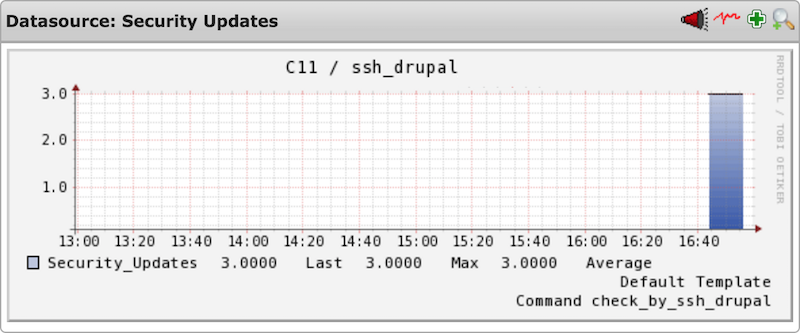
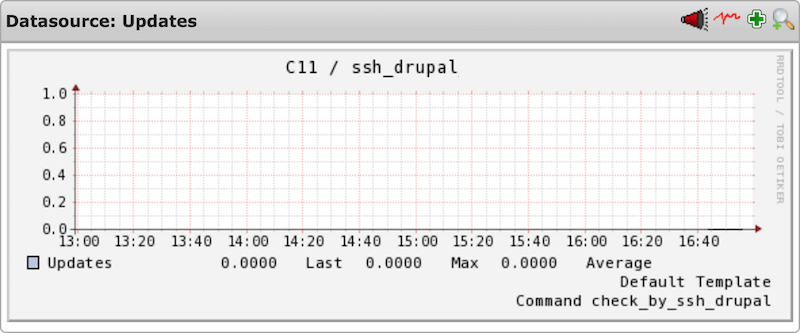
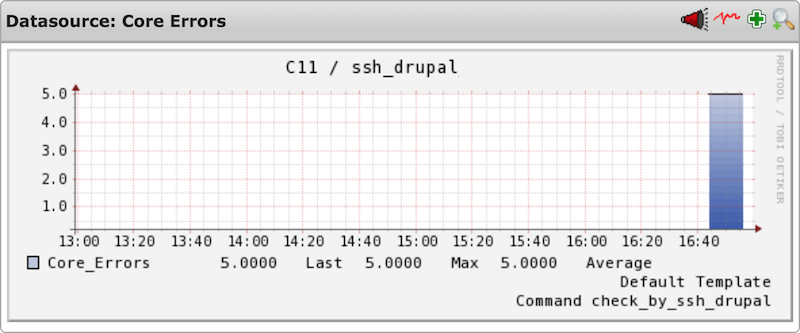
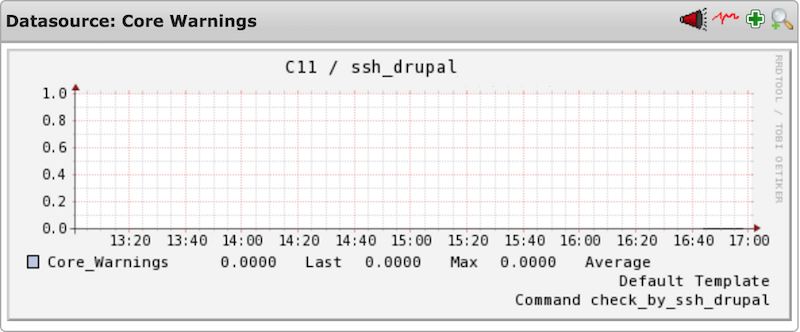
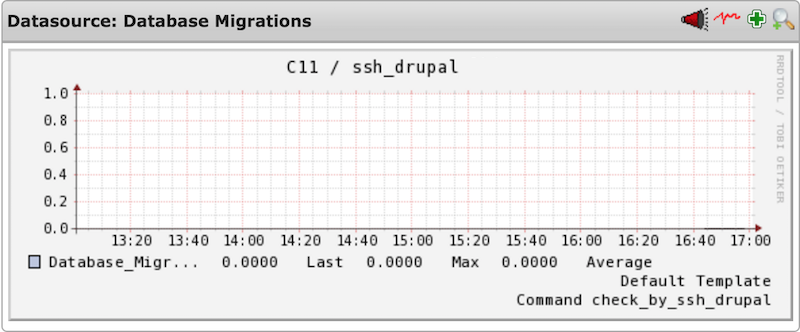
--->
### 5.2 General data
The following performance data gives a general overview about how many OK's, Errors, Warnings and Unknowns have happened over time. This way you can also see how quickly the reaction time has been to occured problems.
**Best practise:**
* OK: should always be a high vertical line
* Error: Should only have short peaks
* Warning: Should only have short peaks
* Unknown: Should never happen
<!---
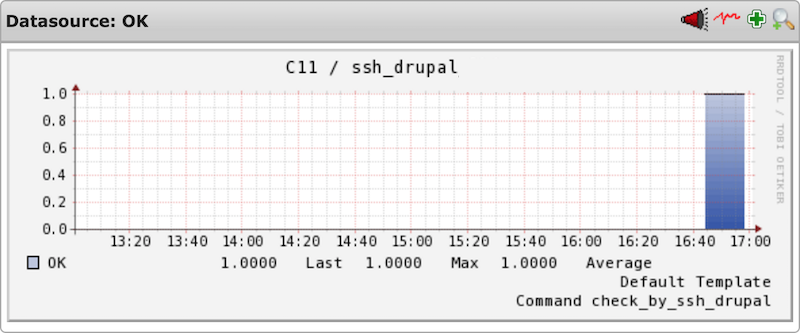
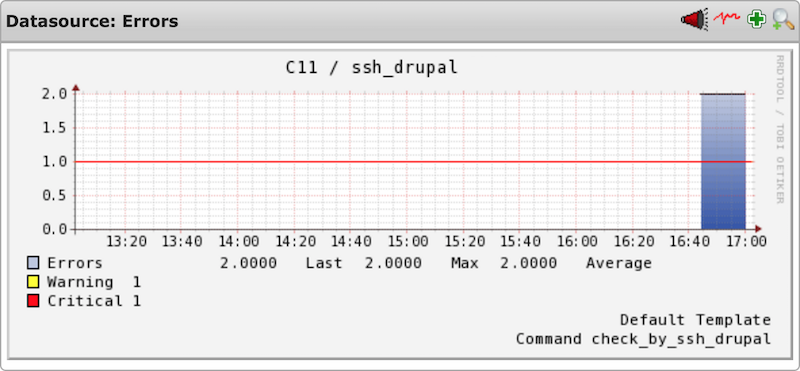
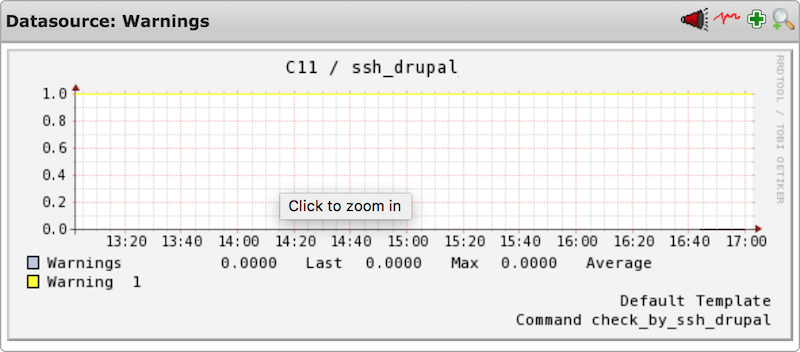

--->
## 6. License
[](http://opensource.org/licenses/mit)


